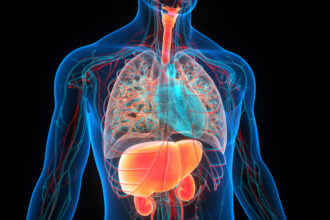A new study reveals that children who remain sedentary for over six waking hours daily are at a substantially higher risk of developing severe fatty liver disease and liver cirrhosis by the time they reach young adulthood. This groundbreaking research will be presented at the upcoming ENDO 2024, the annual meeting of the Endocrine Society, held in Boston, Massachusetts, and concurrently published in Nature’s npj Gut and Liver journal.
Professor Andrew Agbaje, M.D., M.P.H., PhD, the University of Eastern Finland lead investigator in Kuopio, stated, “We’ve discovered that the link between a sedentary lifestyle and liver damage is likely causal.” Prof. Agbaje, also affiliated with the University of Exeter in England, emphasized the need for public awareness about the health risks sedentariness poses to children, adolescents, and young adults. He highlighted the potential outcomes of advanced fatty liver disease and liver cirrhosis, such as increased risk of liver cancer or the necessity for a liver transplant in the future.
The condition known as metabolic-associated steatotic liver disease (MASLD), previously termed fatty liver disease, occurs due to non-alcoholic factors but is associated with elements of metabolic syndrome. Prof. Agbaje’s research leveraged data from the Avon Longitudinal Study of Parents and Children (ALSPAC) or the “Children of the ’90s” study, involving 2,684 participants who were tracked from ages 11 to 24. These participants wore waist accelerometers to monitor their physical activity levels and underwent liver ultrasound scans and blood tests to check for liver health at ages 17 and 24.
Findings from the study indicated that the average child spent six hours per day being sedentary, a figure which increased to nine hours by young adulthood. However, the same amount of time was spent in light-intensity physical activity during childhood, which helped mitigate the harmful effects of sedentariness. The research further found that for every additional half-hour of sedentary behaviour beyond six hours, the likelihood of developing fatty liver disease before age 25 increased by 15%. Conversely, each additional half-hour of light-intensity physical activity reduced the odds of severe fatty liver disease by 33%.
Prof. Agbaje noted that changes in the balance between passive and active time were critical for disease development. By age 24, 20% of the participants had MASLD, a significant increase from the 2.5% prevalence at age 17, an eightfold increase in just seven years. Interestingly, engaging in light-intensity physical activity for at least three hours daily could reverse premature liver damage, though it was less effective against liver cirrhosis.
Prof. Agbaje stressed that while moderate-to-vigorous physical activity is widely promoted, the often-overlooked light-intensity activity is most beneficial. Such activities include playing outdoors, walking the dog, and other gentle forms of exercise, which are crucial for maintaining liver health and preventing early-onset liver damage. This finding challenges the conventional emphasis on more intense physical activity and underscores the importance of integrating lighter, more frequent physical activities into the daily routines of young individuals.
More information: Andrew O. Agbaje et al, Accelerometer-based sedentary time and physical activity with MASLD and liver cirrhosis in 2684 British adolescents, Gut and Liver. DOI: 10.1038/s44355-024-00002-y
Journal information: Gut and Liver Provided by The Endocrine Society








